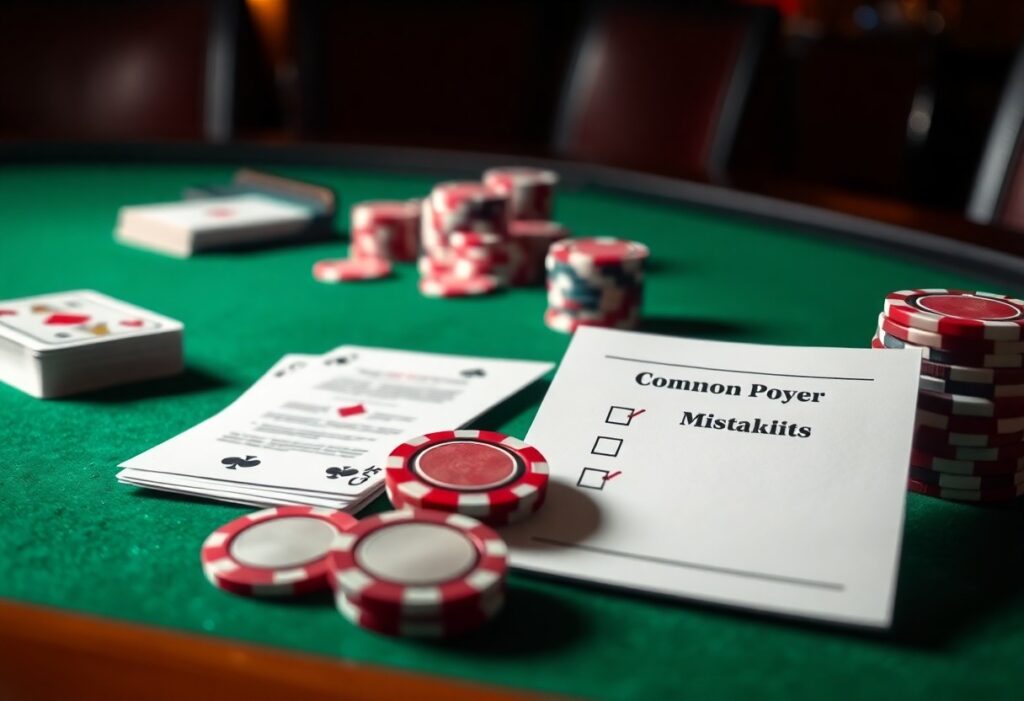
This guide highlights the common poker mistakes players often make in a casino setting, aiming to enhance your overall gameplay. Understanding these pitfalls can significantly influence your chances of success at the table. From poor bankroll management to ignoring position, these errors can lead to unnecessary losses. By avoiding these missteps, you can improve your strategy and maximize your enjoyment of the game while increasing your potential for winning.
Types of Poker Games
Understanding the various types of poker games available in casinos is crucial for strategic play. The most common formats include cash games, where players join and leave freely, and tournament play, which entails a structured competition with buy-ins and blind level increases. Each game type has its dynamics and strategies that can significantly affect your performance. Familiarizing yourself with these differences will enhance your overall game proficiency. Thou must choose wisely based on your style and objectives.
| Type | Key Features |
|---|---|
| Cash Games | Flexibility in betting, cash is always on the table |
| Tournament Play | Set buy-ins, blind levels increase, elimination format |
| Multi-Table Tournaments | Large player pool, multiple tables, gradual eliminations |
| Sit and Go | Quick format, begins with a small number of players |
| Home Games | Informal setting, often with unique house rules |
Cash Games
In cash games, players engage with chips that represent actual money, allowing for more flexibility and control over their stakes. Players can buy in for a specific amount and leave whenever they choose, making it vital to adopt a strategy that fits your bankroll. Successful players often focus on their table position, hand selection, and reading opponents to maximize winnings.
Tournament Play
Tournament play involves players who pay a set buy-in to compete for a prize pool, which can be significantly larger than individual stakes in cash games. Players start with a fixed number of chips and navigate through levels of increasing blinds, leading to a challenging elimination format. Wise players develop strategies that prioritize survival and chip accumulation, balancing aggression with caution.
In tournament play, each decision can greatly influence not only your chip stack but your overall standing in the competition. Optimizing your strategy involves understanding blind structure, adapting to evolving opponent styles, and utilizing chip stack management effectively. For example, during early levels, a tight approach may be prudent, while adapting to a more aggressive style as the tournament progresses can capitalize on weaker players. Staying aware of table dynamics, position, and relative chip counts will facilitate smarter play as you advance through various stages.
Common Mistakes to Avoid
Mismanaging Bankroll
One frequent error is mismanaging your bankroll. Without a proper budget, players may start with good intentions but quickly find themselves playing beyond their limits. Set clear spending limits and stick to them. Executing this strategy protects your funds and enhances your overall gaming experience, reducing emotional decisions that lead to losses.
Playing Too Many Hands
Playing too many hands is another common pitfall. Newer players often feel compelled to participate in every round, mistakenly believing it will increase their chances of winning. However, this leads to overextending oneself and often results in costly mistakes. Tightening your ranges and being more selective can significantly improve your gameplay.
Specifically, maintaining a disciplined approach to selective hand playing can help players make more informed and strategic decisions. For example, instead of folding or calling with weak hands, focus on playing strong starting hands that increase your odds of winning. Analyzing your position at the table and the tendencies of your opponents can also guide when to play or fold, ultimately leading to better outcomes and protecting your bankroll.
Tips for Success
Achieving success at the poker table involves a combination of strategy, discipline, and skill. Focus on managing your bankroll wisely, understanding the rules of the game, and honing your skills. Regularly practice, review your game, and learn from both victories and mistakes. Pay attention to other players, and stay calm under pressure. Consider these elements important to developing a winning mindset:
- Bankroll Management
- Study Your Game
- Stay Focused
After prioritizing these components, you’ll create a solid foundation for success.
Understanding Position
Your position at the table significantly impacts your decision-making process. Being in an early position requires a tighter hand selection, while a later position allows for more flexibility and the opportunity to gather information based on opponents’ actions. Being aware of your position helps dictate when to bet, fold, or raise, maximizing your potential for profit.
Reading Opponents
Effectively reading opponents is vital to making informed decisions. Pay attention to their betting patterns, body language, and tendencies. Identifying whether they are aggressive or passive can provide insight into how they approach the game. Observe how they react in various situations, especially under pressure, to anticipate their moves.
Understanding your opponents’ ranges and recognizing when they may be bluffing versus holding strong hands can elevate your game. For instance, if a player frequently bets large on the turn after checking the flop, they may be employing a bluff strategy or possess a strong hand. Keeping a mental note of these behaviors can lead to more profitable plays and allow you to adapt your strategy accordingly. Noticing trends across multiple hands can also provide a clearer picture of their playing style, enhancing your overall game strategy.
Step-by-Step Strategy Guide
| Strategy Component | Key Insights |
|---|---|
| Pre-Flop Decisions | Understand starting hand selection and position. Focus on playing strong hands from early positions and widen your range in late positions. |
| Post-Flop Play | Evaluate pot odds and implied odds. Adapt your strategy based on the flop texture and your opponents’ tendencies. |
Pre-Flop Decisions
Strong pre-flop decisions set the stage for successful gaming. Assess your hand strength in relation to your position at the table; early positions require tight hand choices, while late positions allow for a broader selection. Cultivating awareness of your opponents’ playing styles can also inform your decisions, making it easier to identify when to fold or raise.
Post-Flop Play
Mastering post-flop play involves analyzing the flop and its implications on your hand strength and your opponents’. Focus on factors like board texture, which can indicate potential straight or flush draws. Adapting your betting strategy is vital; if the flop connects favorably with your hand, consider aggressive betting to build the pot or protect against draws.
Further evaluating your opponents’ actions is also vital in post-flop play. If they show weakness through check-calling, consider bluffing with missed draws or weaker hands. Conversely, a strong opponent’s bet may suggest a solid hand, prompting you to reassess your approach. Always factor in the pot odds to determine if a call is mathematically sound, especially when the board presents multiple draw possibilities.
Factors Influencing Game Performance
Multiple factors impact your performance at the poker table, influencing decisions and outcomes. Understanding these elements can elevate your gameplay effectively. Key factors include:
- Skill Level
- Experience
- Emotional State
- Opponent’s Style
Assume that recognizing these factors can help refine your strategy and enhance your overall performance.
Psychological Factors
Psychological elements play a significant role in poker performance. Factors like tilt, confidence, and focus can dictate how you make decisions during a game. It’s vital to manage emotions effectively, as a slip in mental clarity can lead to costly mistakes. Remain self-aware of your mental state while playing. Assure that you maintain a level head to perform at your best.
- Tilt
- Stress
- Confidence Levels
Assume that a strong psychological approach will enhance your capability to capitalize on your opponents’ weaknesses.
Table Dynamics
Understanding table dynamics is vital for adjusting your tactics in real-time. Factors like players’ tendencies, stack sizes, and position can influence how you engage with opponents. An aggressive table might require a tighter strategy, while a passive one could allow for more daring plays. Additionally, being aware of who is bluffing or who is playing conservatively helps tailor your aggression. Consider using position effectively to leverage your advantages. Assure that adapting your approach based on these dynamics is integral to long-term success.
Pros and Cons of Different Approaches
| Approach | Pros | Cons |
|---|---|---|
| Aggressive Play | Can pressure opponents into making mistakes | Risk of losing large pots when bluffs fail |
| Conservative Style | Reduces risk, preserving stack size | May miss opportunities to win bigger pots |
| Loose Playing | Can build a varied playing profile | Often leads to poor hand selection |
| Selective Aggression | Combines aggression with hand strength | Requires strong situational awareness |
| Farm Play | Good for building experience | Can dull competitive edge |
| Balanced Approach | Adapts to opponents’ strategies | Difficult to execute consistently |
| Reading Opponents | Improves decision-making | Requires significant experience and attention |
| Playing Tight | Increases chances of strong hand | Can be predictable |
| Bluffing | Can win pots without the best hand | Risk of being caught can scare future opponents |
| Adjusting to Players | Makes strategies dynamic | Can lead to inconsistent play |
Aggressive Play
Aggressive play involves consistently betting and raising rather than merely calling. This strategy can overwhelm opponents, forcing them into tough decisions. It’s particularly effective in shorthanded games, where pressure can capitalize on weaknesses. However, without a solid grasp of the situation and opponents, it risks substantial losses, especially when bluffs are called.
Conservative Style
A conservative style focuses on playing fewer hands and prioritizing strong starting hands. This strategy mitigates losses and allows players to navigate through variance more comfortably. While it provides a safety net, relying solely on this approach can lead to missed opportunities for larger pots and gives opponents room to exploit your predictability.
Many successful players use a conservative style as a foundation. By playing selectively, they minimize risks while waiting for favorable situations. This approach is especially useful in tournament play, where chip preservation is necessary. However, balancing this style with occasional aggression is critical for maintaining unpredictability and capitalizing on opponents’ mistakes, ensuring a wider range of outcomes during crucial moments in the game.
Conclusion
On the whole, avoiding common poker mistakes is imperative for improving your performance and enhancing your enjoyment while playing in a casino. Being aware of tendencies such as playing too many hands, neglecting position, and mismanaging your bankroll can significantly impact your results. By focusing on strategic decision-making and maintaining discipline, players can minimize errors and create a more profitable gaming experience. Continuous learning and self-assessment will ultimately lead to a deeper understanding of the game and greater success at the tables.
FAQ
Q: What are the common mistakes players make in hand selection while playing poker in a casino?
A: Many players tend to play too many hands, especially in early positions, leading to poor overall hand choices. It’s important to focus on strong starting hands and be selective based on position at the table. Additionally, failing to adapt hand selection based on table dynamics can result in missed opportunities to capitalize on weaker opponents.
Q: How can bankroll management mistakes impact a player’s success in casino poker?
A: Improper bankroll management can lead players to make risky decisions or participate in games beyond their financial means. Many players either play with too little of their bankroll at stake or chase losses by increasing their bets without consideration. Establishing limits and knowing when to walk away are necessary to maintaining a healthy bankroll.
Q: What psychological errors should players avoid during a casino poker game?
A: Players often fall prey to emotional responses such as tilt, which can lead to poor decision-making and irrational betting. Allowing anger, frustration, or overconfidence to influence gameplay can result in costly mistakes. Staying focused, maintaining a level head, and making decisions based on logic rather than emotions is vital for consistent success.



